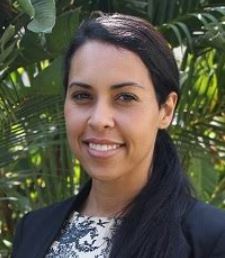Elizabeth Adler
 Affairs of the heart
Affairs of the heart
2019 UNE Young Distinguished Alumni Award Winner
International affairs were a regular dinner-table topic of conversation for Elizabeth Adler (nee Prior) growing up. Lively discussion ranged from humanitarian crises, to the importance of gender equality and women’s empowerment.
"My Somali mother Sue and her nine sisters came from a poor rural family and were withdrawn from school at a young age, but my mother fought hard to stay in school," Elizabeth says. "She understood the importance of education and studied hard, coming third in her district in her high school entrance exams. She could not believe her luck when she earned a scholarship to study at an American Evangelical school in Kenya."
Sue went on to become a teacher and then a women’s development officer with Oxfam UK, where she met Elizabeth's father Julian, who was then an Oxfam Project Coordinator. Two years later, the couple was forced to evacuate the country and move to Australia when the Somali civil war broke out.
"I guess my interest in working in international development can be traced back to my parents' experiences and those early family conversations," says Elizabeth. Enrolling in a Bachelor of Arts (International Studies)/Bachelor of Laws at UNE seemed only natural, but she was already thinking far beyond Australia's borders.
"I volunteered with the Armidale Branch of Amnesty International, supporting its campaigns, and completed an internship with the Australian Human Right Commission during my studies, in what was then the Sex and Age Discrimination Unit," Elizabeth says. "Sex Discrimination Commissioner Elizabeth Broderick served as an important role model at that time; I remember us discussing the superannuation gap between men and women and her saying ‘a man is not a financial plan', which really stuck with me."
The experiences broadened Elizabeth's understanding of human rights issues and furthered her interest in being part of Australia’s efforts to address poverty in the developing world. "One of the most memorable courses I took at UNE focussed on Australia’s response to civil unrest in the Solomon Islands, through the Regional Assistance Mission," Elizabeth says. "This mission marked the official beginning of the end of violent inter-ethnic conflict in the Solomon Islands and highlighted Australia’s important role in the Indo-Pacific. I was proud of Australia’s response, and thought to myself - 'I want to be part of that'."
After a short stint working as a research officer with the Australian Human Rights Commission, on the review of the treatment of women in the Australian Defence Force Academy, Elizabeth was employed by the Australian Department of Foreign Affairs and Trade (DFAT) in Canberra. It was then that her diplomatic career really took off.
Elizabeth undertook a short-term stint with the Australian Embassy in Myanmar, supporting development operations, gender equality work and a UNICEF child protection program. She also enjoyed short periods working at the Australian High Commission in Papua New Guinea, helping to build the leadership capacity of the public sector, and at our embassy in Jakarta, where she supported the implementation of the Australia Awards Scholarships program, providing opportunities for the alumni of Australian universities.
For the past year Elizabeth has been a diplomat at the Australian Embassy in Cambodia, managing the Australia Awards program, the New Colombo Plan and Australian Volunteers Program, supporting delivery of a gender-based violence program and providing advice on higher education and gender equality. It's an impressive resume for a 30-year-old, which is why UNE has recognised Elizabeth with a Young Distinguished Alumnus Award.
"Working with DFAT is more than a job; it's a career," Elizabeth says. "In my current role I engage with high-level Cambodian government officials and representatives from universities, international and national NGOs, and Australian scholarship recipients.
"It's inspiring to meet those who are working extremely hard to make a difference, including people who have won Australia Awards scholarships to study in Australia. I get to see the fruits of their labour when they return. Some have raised community awareness about the causes of cancer, built a highly successful café franchise, lifted the standards of Cambodia’s universities, and advocated for women in leadership in the public service."
DFAT offers a diverse and interesting range of jobs in foreign policy, development and trade, which should satisfy Elizabeth for years to come."Over the next 10-20 years I would like to focus on development issues in Africa because, despite its potential, it is still extremely underdeveloped and poverty is endemic," she says.

